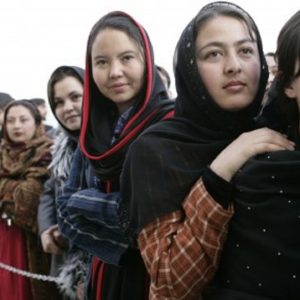This past weekend, our government and the Taliban agreed to a peace deal. These agreements can sometimes be fragile, and only time will tell if it will truly lessen the violence in the country, but it is my fervent hope that Afghanistan may finally be closer to peace.
It is also my fervent hope that moving forward, women have a full voice and seats at any negotiating tables, and that when any final agreements are reached, they include detailed protections for all Afghan citizens, especially women.
The young Afghans who turn 18 this year are the first ones to grow up without ever knowing the draconian restrictions once imposed by the Taliban. They are the first to know mothers not forced to wear the burqa, the first to see girls walking to school in the morning, the first to witness a re-opening of universities, elections, a free press, trade and links with the outside world.
They are poised to blaze a different path. But to do that, they — men and women — need the space and support to thrive and prosper.
Critically, women must be included in the economy. Today, there are 1,200 registered female businesses, an Afghanistan Women Chamber of Commerce and Industry, and a special multi-step certification program to identify “Made by Afghan Women” products and women-owned businesses. In addition, millions of women are now paid for work that they perform at home.
Slowly, women are also representing Afghanistan in international trade. In March, Maboba Zamani, the president of Marhaba Zarin Handicraft Co., which specializes in rugs, will attend the Turkey-Afghanistan International Trade Show in Istanbul to present her “Made by Afghan Women” certified rugs for international buyers.
Just 10 years ago, many female rug makers in her city of Mazar e Sharif knew Afghan carpets were famous in other countries, but after decades of war, the basic business skills of how to contact traders and sell their products abroad had been lost.
Also critical to Afghanistan’s future is a continued commitment to education. During President George W. Bush’s administration, the U.S. government announced an initial grant to support the creation of the American University of Afghanistan.
AUAF’s mission was to establish a private, liberal arts education institution. Since students enrolled in 2007, AUAF has started Afghanistan’s first MBA program, developed a B.A. of Arts and Law degree in conjunction with Stanford University to help train lawyers for Afghanistan’s judicial system, and had 76 Fulbright Scholars.
In a nation where, sadly, 88 percent of women are illiterate, women comprise 42 percent of AUAF’s student body. AUAF provides an educational model and foundation to allow dedicated Afghans the opportunity to succeed. Congress and the American people have generously supported AUAF since its founding, and I hope that support continues in this transition.
Education is an area where Afghanistan’s achievements during the last 18 years are remarkable. More than 13,000 new schools have opened, many in newly constructed buildings. Where in 2002, barely 1 million children, nearly all boys, were enrolled in school, today that number exceeds 9 million. And this new generation will have literate women: 3.5 million of today’s students are girls.
Women also play a key role in the educational system. One-third of teachers in general education are women, and female teachers currently account for more than 60 percent of Teacher Training College graduates.
Afghan women have a voice, and they have been using that voice to call for a seat at the table of peace. Once an agreement between the United States and the Taliban is signed, Afghan women must be active participants in establishing the terms of any intra-Afghan peace agreement, and in any monitoring or verification process established.
We know from the history of peaceful resolutions to other conflicts around the world that including women promotes dialogue and trust, bridges divides and builds coalitions. Without women, agreements are likely to dissolve, rather than solidify.
No country will ever be successful when half of its population is left behind. I think often of the words of Zainularab Miri, who ran a hidden school for girls during the Taliban time, and today mentors young Afghan women.
She said, “Together, men and women are like two wings of a bird. If one wing is hurt, the bird cannot fly. Society needs the bird to have both wings.”

